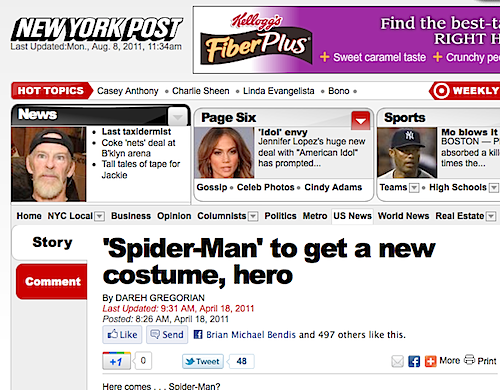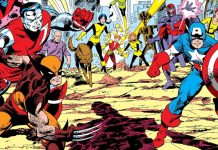A new Cup O’ Joe with Marvel’s Chief Creative Officer Joe Quesada reveals many things, including more about the origin of MIles Morales, and the fact that Quesada has been commissioned by the actual President of the United States for a piece of art. But it also contains an explanation of what has vexed many of late: Marvel’s spoilerific PR in major media. For instance the story of the new dark-skinned Spider-Man broke on Tuesday in USA Today, spoiling the story with its ubiquity before the issue in question came out. However, says Quesada, there really isn’t any other way to do it:
BIG NATIONAL PAPER can break the news during solicitation cycle — that means letting them break it a day or two before the retailer catalog hits the street. Okay, let’s look at that. The news hits, and because the mainstream audience doesn’t know that the catalog and this news is hitting three months before the book ships, comic shops will fill up with new customers looking for a book that doesn’t exist yet. Now we have disappointed would-be customers in comic shops and frustrated retailers who wish they had the book, then and there, to sell. Sure, we can cross our fingers and hope that the article tells people that it won’t be released for three months, but then how many of the people that read the story will remember to go to a comic shop three months later? I would venture on 10% or less. Oh, and don’t hold your breath on a follow up story three months later, you’re already old news. It broke on a national outlet which means very few will want to report it again later, they’re on to the next big thing. And also in this method, the news gets spoiled for comic readers three months in advance.
BIG NATIONAL PAPER is interested and want the news exclusively. Thinking about scenario #1, we decide to keep the info a secret and give BIG NATIONAL PAPER the ability to break the story, but breaking it the day before or the day the title ships so that retailers have the books in hand. Yes, the story will be spoiled for some, but let’s face it, a story this big combined with the Internet is going to get spoiled for some anyway. At least in this scenario, if we do our job right and have plenty of extra copies for retailers to reorder, the odds are better that more people walk away satisfied and the industry is healthier as a whole.
Now mind you, scenario #2 isn’t perfect either, but we have found through experience of doing this kind of thing, that it has worked better than the alternative. I know it frustrates some fans, but it’s the best way to do it for the long-term growth of our industry. Also, it’s not like we do this all the time and spoil dozens of stories a year to the mainstream news. I’ll bet dollars to donuts that the average fan has their favorite stories spoiled many more times by posts on the Internet or gossip columns than by what Marvel ever does in the mainstream press.








If it helps keep print comics afloat, I’m perfectly happy if they overhype and spoil every media-friendly supposed mega-event. I may find the hype ridiculous and amusing, but if it gets people to try out comics, a few spoilers seem like a small price to pay.
It’s hard to take the word of the guy who put out the worst comic in history and takes pride in that fact. Who takes pride in doing your worst?
My question is, how much of this big press coverage leads to actual new, continuing readers, and how much leads to people just nabbing up the issues for “investment” purposes?
A dollar’s a dollar in the end, but if long-term readership is the goal I wonder if conventional (albeit creative) advertising and reviews wouldn’t be more effective.
Marvel is owned by Disney now, which has its hands in all sorts of TV and magazines and websites and whatnot – surely they can get some sort of “family discount” on ad rates?
It’s true, Angelica, sending out review copies a little more often wouldn’t go amiss. I think we’ve only gotten review copies from them for a few of the high prestige literary adaptation GNs in the time I’ve worked at PW.
I can see back before they got bought up by Disney, but surely they can afford a couple hundred bucks a year to send out review copies of their top books these days…
But still, I can understand the thinking that making headlines is not only cheaper than ads, it’s more likely to catch the eye. After all, which are you more likely to ignore, an ad or an article?